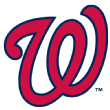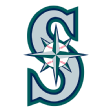On paper, I believe the Washington Nationals head into 2013 as the strongest team in the majors. They have offense, they have pitching, they have depth and they have a good manager.
Just for fun -- and a chance for this Mariners fan to remember the greatest team in franchise history -- I thought I'd compare the Nationals to the 2001 Mariners, the team that won a major league-record 116 games. OK, modern record; the 1906 Cubs did win 116 games as well.
I'll use Baseball-Reference WAR for each player -- listing the 2012 totals for Nationals players, but then projecting a 2013 potential upside. Kind of a best-case scenario. We'll then list a running team tally.

 Catcher: Dan Wilson (1.9 WAR) versus Wilson Ramos (1.5 WAR in 2011)
Catcher: Dan Wilson (1.9 WAR) versus Wilson Ramos (1.5 WAR in 2011)
Let's stick to last names here to avoid confusion. Wilson was a solid defensive catcher known for working well with a staff. He wasn't terrible at the plate but Ramos displayed more power as a rookie than Wilson did in 2001, with 15 home runs to Wilson's 10. If Ramos improves his defense and on-base skills, the Nats will rate the edge.
Nationals upside: 3.0 WAR
Score: Nationals +1.1 wins
First base: John Olerud (4.8) versus Adam LaRoche (4.0)
Olerud hit .302 with a .401 OBP and 21 home runs, a terrific season for one of the more underrated players of the past 20 years. LaRoche had a career-best seasons in terms of WAR in 2012, even finishing sixth in the NL MVP vote. He did won a Gold Glove, but probably doesn't quite match Olerud in the field (he won Gold Gloves in 2002, 2002 and 2003). I can't any room for improvement for LaRoche; if anything, a decline is more likely given his age.
Nationals upside: 4.0 WAR
Score: Nationals +0.3
Second base: Bret Boone (8.5) versus Danny Espinosa (2.4)
Boone had one of the great seasons ever by a second baseman, hitting .331 and leading the AL with 141 RBIs. Many believe he should have been the league's MVP that year, not Ichiro Suzuki. I like Espinosa's game even with all the strikeouts, but we're talking about a .247 hitter versus a .331. Even the most optimistic view doesn't put Espinosa close to Boone.
Nationals upside: 4.2 WAR
Score: Mariners +4.0
Third base: David Bell (3.0) versus Ryan Zimmerman (3.8)
Bell wasn't great with the bat -- .260/.303/.415 -- but Baseball-Reference grades him as the third-best defensive player in the AL that year, bringing his WAR up to a respectable 3.0. Zimmerman once had the kind of defensive reputation, but injuries have slowed him down the past couple of seasons. He hit .319/.381/.564 in the second half, so there are signs he can improve on his overall 2012 numbers. I'm not sure he'll ever be the 7-win player he was in 2009, when he won a Gold Glove, but let's move him up to 5.5 wins.
Nationals upside: 5.5
Score: Mariners +1.5
Shortstop: Carlos Guillen (3.0) versus Ian Desmond (3.2)
Guillen wasn't yet the big hitter he was with the Tigers, batting just .259/.333/.355, but playing well in the field. Desmond had a breakout season in 2012, hitting .292 with 25 home runs. Opinions vary on his defense, and FanGraphs WAR grades Desmond out at 5.4 WAR, best in the majors among full-time shortstops. Considering he played just 130 games, he's certainly capable of a bigger numbers, although his poor walk rate is a red flag.
Nationals upside: 5.2 WAR
Score: Nationals +0.7
Left field: Al Martin (0.9) versus Bryce Harper (5.0)
The Mariners didn't really have a regular left fielder, as eight different players started there. Martin had the most games started there but wasn't particularly good. Are you starting to wonder how this team won 116 games? We'll get there. Harper's rookie season exceeded expectations with a .270/.340/.477 line. Even the Nationals are moving him out from center field, the defensive metrics loved him, with 14 Defensive Runs Saved via Baseball Info Solutions. He loses the positional value of playing center field, so how do we go on his WAR? The readers at FanGraphs are predicting 6.1. That could be conservative.
Nationals upside: 6.5 WAR
Score: Nationals +6.3
Center field: Mike Cameron (5.5) versus Denard Span (4.8)
Cammy hit .267/.353/.480 with 25 bombs and 34 steals and won a Gold Glove, making Mariners fans forget about Ken Griffey Jr. Keep in mind that Safeco was a pitcher's park even in 2001, so some of these offensive numbers are more valuable than they appear. Defensive Runs Saved loved Span's defense with the Twins last year -- +20 runs -- and he does a decent job of getting on base. I think he's more of a 3-win player than a 5-win player, but we'll leave him at 4.8 wins.
Nationals upside: 4.8 WAR
Score: Nationals +5.6
Right field: Ichiro Suzuki (7.5) versus Jayson Werth (0.6)
Ichiro's was the Mariners' lightning rod, slapping base hits everywhere, stealing bases and robbing opponents with his speed and arm, a package that won him MVP honors. Werth was a 4- to 5-win player with the Phillies in 2009 and 2010 but hasn't matched that with the Nationals. He did hit .300 last season, missing about the half the season with a broken wrist, but his range in right field appears to have slipped a grade or two. (It will be interesting to see if the Nats move Werth to left and Harper, clearly the better defender at this point, to right.)
Nationals upside: 3.3 WAR
Score: Nationals +1.4
Edgar Martinez (4.5) versus Nationals pitchers (1.2)
The Mariners get a bonus here, inserting a DH with a .423 OBP in the middle of their order. Nationals pitchers, led by Stephen Strasburg (.277, .759 OPS), Jordan Zimmermann (.193) and Edwin Jackson (.228) were a very good hitting staff, but that doesn't make up the ground on Martinez.
Nationals upside: 1.2 WAR
Score: Mariners +1.9
Bench: Mark McLemore (3.2), Stan Javier (2.6), Tom Lampkin (0.8), Ed Sprague (0.5) versus Tyler Moore (-0.2), Steve Lombardozzi (0.3), Roger Bernadina (0.9), Kurt Suzuki (0.4), Chad Tracy (0.4)
McLemore was kind of a full-time supersub, starting 20-plus game at left field, third base and shortstop and getting nearly 500 PAs. He had a .384 OBP and stole 39 bases in 46 attempts. Javier started 61 games in the outfield, played good D and posted a .375 OBP. The Nats have a deep bench, but they can't match the defensive, on-base and baserunning value McLemore and Javier gave the Mariners.
Nationals upside: 3.5 WAR
Score: Mariners +5.5
No. 1: Freddy Garcia (3.9) versus Gio Gonzalez (4.5)
Garcia led the AL in ERA and innings in 2001, a pretty impressive feat, even if he did get a lot of help from his defense and ballpark. Is there room for improvement in Gonzalez's game? He's been between 199 and 202 innings the past three seasons, so he could add value by throwing another 20 innings, but the Nationals are very conservative with their starters and Gonzalez does run up some high pitch counts. He also allowed just nine home runs, a figure likely to go up. I see a good pitcher, but one who's maxed out.
Nationals upside: 4.5 WAR
Score: Mariners +4.9
No. 2: Jamie Moyer (3.1) versus Stephen Strasburg (2.7)
A guy who throws in the low 80s and a guy who touches the upper 90s on the radar gun. Love the comparison. Moyer went 20-6 with a 3.43 ERA, throwing 209.2 innings. Strasburg obviously has Cy Young potential but has to prove his arm can handle an extra 50 innings. If so, he easily projects as a 5-win pitcher ... and possibly higher. But I think he settles in at 185 innings or so, making it difficult to project him with too much enthusiasm.
Nationals upside: 5.0 WAR
Score: Mariners +3.0
No. 3: Aaron Sele (2.2) versus Jordan Zimmermann (4.4)
Zimmermann's peripherals don't quite match the 2.94 ERA he posted in 2012, so I would expect a little regression unless he improves his strikeout rate.
Nationals upside: 4.5 WAR
Score: Mariners +0.7
No. 4: Paul Abbott (1.1) versus Dan Haren (-0.6)
Abbott was the surprise of the Seattle staff, going 17-4 with a 4.25 ERA. Haren is a bit of a wild card after a down year with the Angels. Haren isn't going to be the 230-inning pitcher he was for so many years, but we can certainly foresee a little improvement if his back problems don't linger.
Nationals upside: 2.5 WAR
Score: Nationals +0.7
No. 5: John Halama/Joel Pineiro (0.3) versus Ross Detwiler (1.6)
Halama was the weak link of the Seattle rotation but Pineiro was superb after getting called up, making 11 starts and posting a 2.03 ERA and 1.4 WAR. I'm a big fan of Detwiler; like Strasburg, he could pitch more innings and increase his value.
Nationals upside: 2.3 WAR
Score: Nationals +2.7
Closer: Kazuhiro Sasaki (1.0) versus Rafael Soriano (2.6)
Closers are evaluated more on their save percentage than their run prevention. You'd think a 116-win team would have had a lights-out closer, but Sasaki had seven blown save, including one Mariners remember all too well, when Seattle blew a 12-0 lead against Cleveland. Soriano rates well in 2012 in part because of the Yankee Stadium park effects. His peripherals are weaker than his actual 2.26 ERA as well. I don't see him coming close to the same WAR in 2013.
Nationals upside: 2.0 WAR
Score: Nationals +3.7
Bullpen: Arthur Rhodes (2.4), Jeff Nelson (1.3), Ryan Franklin (0.6), Norm Charlton (0.5), Jose Paniagua (-0.5), Brett Tomko (-0.6) versus Drew Storen (0.8), Tyler Clippard (0.3), Craig Stammen (1.9), Ryan Mattheus (1.2), Zach Duke (0.4), Christian Garcia (0.3)
Rhodes went 8-0 with a 1.72 ERA to lead the middle Mariners' middle relief corps. The group above compiled 3.7 WAR. The guys listed for the Nationals compiled 4.9 WAR, but Stammen and Mattheus are due for regression -- FanGraphs WAR, which is based more on peripherals than actual runs, had them at a combined 0.6 WAR instead of 3.1, for example. Still, it's a deep pen.
Nationals upside: 4.0 WAR
Score: Nationals: +4.0
So ... did I just predict the Nationals to win 120 games? No, of course not. Not all those players will hit their upside. Somebody will get injured, somebody will have a bad year, somebody will disappoint or not develop.
By the way, I should point out that WAR works well on the team level. The Mariners' cumulative WAR was 62.1 -- and since it starts from a replacement-level baseline of 52 wins, that projects to 114 wins. What's amazing about that Mariners club is that not everything went perfectly -- Al Martin wasn't very good, David Bell didn't put up good offensive numbers for a third baseman, John Halama wasn't that great as a No. 5 starter. But it was a roster where everybody contributed in some way, they had two MVP candidates in Boone and Suzuki, a great two-way player in Cameron, two guys with .400 OBPs in Martinez and Olerud and a deep pitching staff. They were a smart, veteran team, maybe the best defensive team in recent history, ran the bases well and executed in the clutch. Every trigger manager Lou Piniella pulled seemed to work that year.
The Nationals won 98 games last year -- total WAR of 40.8, so they would need to add 22 wins of value to match Seattle's. That's unlikely, of course, but I can easily see this club winning 105 games, something no team has done since the 2004 Cardinals. They probably can't match Seattle's offense, unless Harper or Zimmerman turn in MVP-caliber seasons, which seems a year or too early for Harper and a couple years too late for Zimmerman. But I go through their roster and don't see a single weakness.
I can't wait to watch them.
